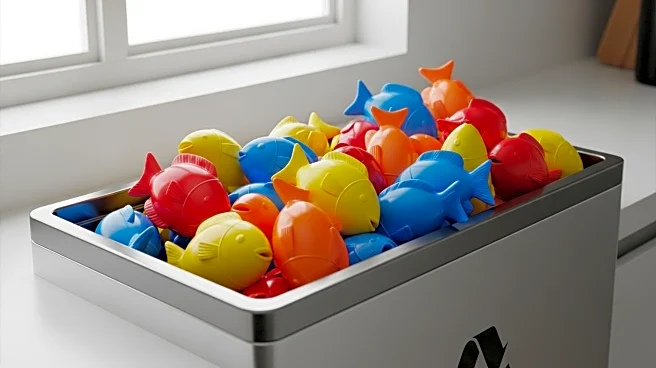What is the story about?
What's Happening?
South Australia has become the first region globally to ban fish-shaped soy sauce dispensers as part of a broader initiative to reduce single-use plastics. The ban, effective from September 1, targets the small polyethylene containers known as shoyu-tai, which were invented in 1954 by Teruo Watanabe. These dispensers, often used in sushi shops, are considered a significant contributor to beach and street litter due to their small size and single-use nature. The new law prohibits pre-filled soy sauce containers with less than 30ml capacity, while allowing plastic sachets. The government encourages the use of bulk bottles or dispensers instead. The ban also includes other single-use plastic items like plastic cutlery and expanded polystyrene food packaging. Marine ecologist Dr. Nina Wootton highlights the environmental impact, noting that these plastics can be mistaken for food by marine life, posing a threat to ecosystems.
Why It's Important?
The ban on fish-shaped soy sauce dispensers is a significant step in addressing plastic pollution, which poses a threat to marine life and ecosystems. By eliminating these single-use plastics, South Australia aims to reduce the volume of waste entering the environment. This initiative reflects a growing global awareness of the need to tackle plastic pollution and encourages other regions to consider similar measures. The move is expected to influence public policy and consumer behavior, promoting sustainable practices in the food industry. Environmental groups, such as the Australian Marine Conservation Society, view this as a positive development but stress the need for comprehensive laws to reduce plastic production and consumption.
What's Next?
The ban is likely to prompt sushi shops and other food establishments to adopt alternative condiment solutions, such as bulk dispensers or refillable containers. This shift may lead to increased demand for sustainable packaging solutions and innovation in the industry. Environmental advocates will continue to push for broader legislation to address plastic pollution, potentially influencing state and federal policies. The success of South Australia's initiative could serve as a model for other regions, encouraging them to implement similar bans and contribute to global efforts to reduce plastic waste.
Beyond the Headlines
The ban on single-use plastics in South Australia highlights the ethical responsibility of businesses and consumers to reduce environmental impact. It underscores the importance of sustainable practices and the role of government in enforcing regulations that protect natural resources. This development may also spark cultural shifts, as consumers become more aware of the environmental consequences of their choices and seek eco-friendly alternatives. Long-term, such measures could lead to significant reductions in plastic pollution and contribute to healthier marine ecosystems.
















